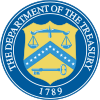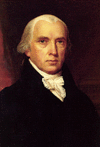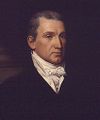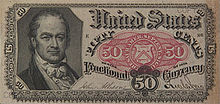- William H. Crawford
-
This article is about the 19th century Georgia politician. For the 18th century U.S. military officer, see William Crawford (soldier).
William Crawford 
7th United States Secretary of the Treasury In office
October 22, 1816 – March 6, 1825President James Madison
James MonroePreceded by Alexander Dallas Succeeded by Richard Rush 9th United States Secretary of War In office
August 1, 1815 – October 22, 1816President James Madison Preceded by James Monroe Succeeded by John Calhoun United States Ambassador to France In office
March 23, 1813 – August 1, 1815Appointed by James Madison Preceded by Joel Barlow Succeeded by Albert Gallatin President pro tempore of the Senate In office
March 24, 1812 – March 23, 1813President James Madison Preceded by John Pope Succeeded by Joseph Varnum United States Senator
from GeorgiaIn office
November 7, 1807 – March 23, 1813Preceded by George Jones Succeeded by William Bulloch Personal details Born February 24, 1772
Amherst County, VirginiaDied September 15, 1834 (aged 62)
Crawford, Georgia, United StatesPolitical party Democratic-Republican Party Spouse(s) Susanna Gerardine Profession Lawyer
Judge
Farmer
TeacherWilliam Harris Crawford (February 24, 1772 – September 15, 1834) was an American politician and judge during the early 19th century. He served as United States Secretary of War from 1815 to 1816 and United States Secretary of the Treasury from 1816 to 1825, and was a candidate for President of the United States in 1824.
Contents
Political career
In 1803, Crawford was elected to the Georgia House of Representatives as a member of the Democratic-Republican Party. In 1807, Crawford joined the 10th United States Congress mid-term as the junior U.S. Senator from Georgia when the Georgia legislature elected him to replace George Jones, an appointee who had held the office for a few months after the death of Abraham Baldwin.
Crawford was elected President pro tempore in 1811. When Vice President George Clinton died on April 20, 1812, Crawford, as President pro tempore, became "Acting Vice President" until March 4, 1813.
In 1813, President James Madison appointed Crawford as the U.S. minister to France during the waning years of the First French Empire; Crawford held that ministerial post until 1815, shortly after the end of the War of 1812.
Upon Crawford's return, Madison appointed him as Secretary of War. After slightly more than a year of satisfactory service in that post (and after disclaiming interest in the 1816 Democratic-Republican nomination for President), Crawford moved within the Cabinet to become Secretary of the Treasury. He remained in that position through the rest of Madison's term and Monroe's entire administration which ended in 1825.
Crawford was again a leading candidate for the Democratic-Republican presidential nomination in 1824. However, Crawford was put out of the running because of a paralytic stroke he suffered in 1823 that was brought on by a prescription given to him by his physician.[1] The Democratic-Republican Party split around this time and one of the splinter groups nominated Crawford. Despite Crawford's improved health (and the support of former presidents Madison and Thomas Jefferson), he finished third in the electoral vote, behind John Quincy Adams and Andrew Jackson. He thus was still in the nominal running when the Presidential election ended up in the House of Representatives, due to the provision within the Twelfth Amendment giving a line on the House ballot to each of the top three candidates, but his stroke made him a non-factor there.
Refusing Adams's request that he remain at the Treasury, Crawford then returned to Georgia, where he was appointed as a state superior court judge. Crawford remained an active judge until his death a decade later.
Societies
During the 1820s, Crawford was a member of the prestigious society, Columbian Institute for the Promotion of Arts and Sciences, who counted among their members former presidents Andrew Jackson and John Quincy Adams and many prominent men of the day, including well-known representatives of the military, government service, medical and other professions.[2] Crawford also served as a Vice President in the American Colonization Society from its formation in 1817 until his death.
Personal life
Crawford was born in Amherst County, Virginia, but his family moved south to the village of Appling in Columbia County, Georgia, when he was a boy. As a young man, he worked as a farmer and a schoolteacher for about 10 years, then began to practice law in Lexington, Georgia, in 1799.
His cousin George W. Crawford served as Secretary of War under President Zachary Taylor.
Crawford was buried in Crawford Cemetery in Crawford, Georgia.
Legacy
The following are named in honor of William H. Crawford.
Cities and Towns
Counties
Crawford is buried in Crawford, Georgia. In 1875, Crawford appeared on the 50 cent bill.
Notes
- Garraty, John A. and Mark C. Carnes. American National Biography, vol. 5, "Crawford, William Harris". New York : Oxford University Press, 1999.
References
- ^ They Also Ran, Irving Stone, pg. 36
- ^ Rathbun, Richard. The Columbian institute for the promotion of arts and sciences: A Washington Society of 1816-1838.. Bulletin of the United States National Museum, October 18, 1917. http://books.google.com/books?id=MY-5AAAAIAAJ&pg=PA118&lpg=PA118&dq=%22columbian+institute%22#v=onepage&q=%22columbian%20institute%22&f=false. Retrieved 2010-06-20.
External links
United States Senate Preceded by
George JonesSenator (Class 2) from Georgia
1807–1813
Served alongside: John Milledge, Charles TaitSucceeded by
William BullochPreceded by
John PopePresident pro tempore of the Senate
1812–1813Succeeded by
Joseph VarnumDiplomatic posts Preceded by
Joel BarlowUnited States Minister to France
1813–1815Succeeded by
Albert GallatinPolitical offices Preceded by
James MonroeUnited States Secretary of War
Served under: James Madison
1815–1816Succeeded by
John CalhounPreceded by
Alexander DallasUnited States Secretary of the Treasury
Served under: James Madison, James Monroe
1816–1825Succeeded by
Richard RushParty political offices Preceded by
James MonroeDemocratic-Republican nominee for President of the United States
1824
Served alongside: John Quincy Adams, Andrew Jackson, Henry ClayParty abolished United States Senators from Georgia Class 2 Few • Jackson • Walton • Tattnall • Baldwin • Jones • Crawford • Bulloch • Bibb • Troup • Forsyth • Walker • Ware • Cobb • Prince • Troup • King • Lumpkin • Berrien • Charlton • Toombs • H. Miller • Norwood • B. Hill • Barrow • A. Colquitt • Walsh • Bacon • West • Hardwick • Harris • Cohen • Russell • Gambrell • Nunn • Cleland • Chambliss
Class 3 United States Secretaries of War and Secretaries of the ArmySecretaries at War 

Secretaries of War Knox • Pickering • McHenry • Dexter • Dearborn • Eustis • Armstrong • Monroe • W. Crawford • Calhoun • Barbour • P. Porter • Eaton • Cass • Poinsett • Bell • Spencer • J. Porter • Wilkins • Marcy • G. Crawford • Conrad • J. Davis • Floyd • Holt • S. Cameron • Stanton • Schofield • Rawlins • Belknap • A. Taft • J. Cameron • McCrary • Ramsey • R. Lincoln • Endicott • Proctor • Elkins • Lamont • Alger • Root • W. Taft • Wright • Dickinson • Stimson • Garrison • Baker • Weeks • D. Davis • Good • Hurley • Dern • Woodring • Stimson • Patterson • RoyallSecretaries of the Army Assistant Secretaries of War Scott • Dana • Eckert • Grant • Doe • Meiklejohn • Sanger • Oliver • Breckinridge • Ingraham • Crowell • Williams • Wainwright • D. Davis • MacNider • Hurley • Payne • Woodring • L. Johnson • Patterson • McCloy • PetersenUnder Secretaries of the Army United States Secretaries of the Treasury Hamilton • Wolcott • Dexter • Gallatin • Campbell • Dallas • Crawford • Rush • Ingham • McLane • Duane • Taney • Woodbury • Ewing • Forward • Spencer • Bibb • Walker • Meredith • Corwin • Guthrie • Cobb • Thomas • Dix • Chase • Fessenden • McCulloch • Boutwell • Richardson • Bristow • Morrill • Sherman • Windom • Folger • Gresham • McCulloch • Manning • Fairchild • Windom • Foster • Carlisle • Gage • Shaw • Cortelyou • MacVeagh • McAdoo • Glass • Houston • Mellon • Mills • Woodin • Morgenthau • Vinson • Snyder • Humphrey • Anderson • Dillon • Fowler • Barr • Kennedy • Connally • Shultz • Simon • Blumenthal • Miller • Regan • Baker • Brady • Bentsen • Rubin • Summers • O'Neill • Snow • Paulson • Geithner
 United States Ambassadors to France
United States Ambassadors to France 
Envoys Benjamin Franklin, Arthur Lee, Silas Deane (substituted by John Adams in 1778) 1776–1779
Ministers Plenipotentiary Envoy Extraordinary and
Minister PlenipotentiaryGallatin 1816–23 · Brown 1824–29 · Rives 1829–32 · Harris (chargé d'affaires) 1833 · Livingston 1833–35 · Barton (chargé d'affaires) 1835 · Cass 1836–42 · King 1844–46 · Rush 1847–49 · Rives 1849–53 · Mason 1853–59 · Faulkner 1860–61 · Dayton 1861–64 · Bigelow 1865–66 · Dix 1866–69 · Washburne 1869–77 · Noyes 1877–81 · Morton 1881–85 · McLane 1885–89 · Reid 1889–92 · Coolidge 1892–93
Ambassador Extraordinary
and PlenipotentiaryEustis 1893–97 · Porter 1897–05 · McCormick 1905–07 · White 1907–09 · Bacon 1909–12 · Herrick 1912–14 · Sharp 1914–1919 · Wallace 1919–21 · Herrick 1921–29 · Edge 1929–33 · Straus 1933–36 · Bullitt 1936–40 · Leahy 1941–42 · Tuck (chargé d'affaires) 1942 · Caffery 1944–49 · Bruce 1949–52 · Dunn 1952–53 · Dillon 1953–57 · Houghton 1957–61 · Gavin 1961–62 · Bohlen 1962–68 · Shriver 1968–70 · Watson 1970–72 · Irwin 1973–74 · Rush 1974–77 · Hartman 1977–81 · Galbraith 1981–85 · Rodgers 1985–89 · Curley 1989–93 · Harriman 1993–97 · Rohatyn 1997–2000 · Leach 2001–05 · Stapleton 2005–09 · Rivkin 2009–
Cabinet of President James Madison (1809–1817) Vice President George Clinton (1809–1812) · Elbridge Gerry (1813–1814)
Secretary of State Robert Smith (1809–1811) · James Monroe (1811–1814, 1815–1817)Secretary of the Treasury Albert Gallatin (1809–1814) · George W. Campbell (1814) · Alexander J. Dallas (1814–1816) · William H. Crawford (1816–1817)Secretary of War William Eustis (1809–1813) · John Armstrong, Jr. (1813–1814) · James Monroe (1814–1815) · William H. Crawford (1815–1816)Attorney General Secretary of the Navy Cabinet of President James Monroe (1817–1825) Vice President Daniel D. Tompkins (1817 – 1825)
Secretary of State John Quincy Adams (1817 – 1825)Secretary of the Treasury William H. Crawford (1817 – 1825)Secretary of War John C. Calhoun (1817 – 1825)Attorney General Richard Rush (1817) • William Wirt (1817 – 1825)Secretary of the Navy Benjamin Williams Crowninshield (1817 – 1818) • Smith Thompson (1819 – 1823) • Samuel L. Southard (1823 – 1825)Categories:- Madison administration cabinet members
- Monroe administration cabinet members
- 1772 births
- 1834 deaths
- People from Amherst County, Virginia
- Georgia (U.S. state) Democratic-Republicans
- Democratic-Republican Party United States Senators
- Georgia (U.S. state) state court judges
- Members of the Georgia House of Representatives
- United States ambassadors to France
- United States presidential candidates, 1824
- United States Secretaries of the Treasury
- United States Secretaries of War
- United States Senators from Georgia (U.S. state)
Wikimedia Foundation. 2010.


